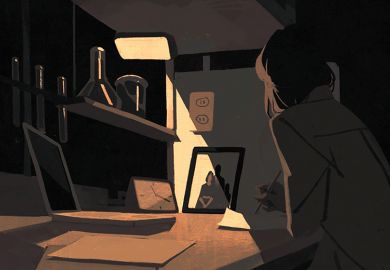We face the prospect of being quarantined for a few weeks because of the coronavirus pandemic, and many of us are bound to find this very challenging. Governments are advising people to impose social distancing and to restrict human contact so that the chance of spreading the virus can be minimised. At the same time, schools are closing, and many of us are forced to work from home.
For many of us, living in close quarters with other members of our family and having to fit in work around children and other caring responsibilities seems like a nightmare because the disruption means any semblance of a daily routine being taken away. What’s more, the natural anxieties and worries that arise with the coronavirus outbreak will only exacerbate this sense of horror.
And many academics will understandably be worried about the impact that this will have on their research productivity and output.
I have been working from home as an academic consultant, speaker and writer since my twins were born almost three years ago. I have just recently written a book, Sway: Unravelling Unconscious Bias, so I have plenty of experience of being holed up at home. Here are some lessons and tips that I have gathered during this time:
Maintain virtual contact. Loneliness during self-isolation can be debilitating. Research from the American Psychological Association has shown that being connected to others socially is crucial to both well-being and survival. Also, long-term loneliness can induce “fight-or-flight” stress signalling, which negatively affects the immune system, so people who feel lonely have less immunity and more inflammation than others.
While we cannot connect with others face to face, it is important that we maintain some sense of community by having team meetings and catch-ups over Skype, Zoom or FaceTime.
Having a writing buddy, someone who is an accountability partner, or just someone with whom to have a quick cup of coffee most afternoons and share concerns, have a laugh and bounce some ideas off can be beneficial to one’s well-being. I know from experience that there is only so long that one can converse with small children. After a while, they are not really that interested in my chatter about my work!
Be flexible with your routine. In my experience, setting a fixed routine does not always work, especially if you have children and must adapt every day. Having a rigid routine might feel like a good thing for one's mental health, but failing to stick to it can be quite devastating. Acknowledging that things are likely to change really helps me personally.
Set realistic expectations. While being ambitious and setting challenging goals for ourselves is something most academics will be familiar with, I have realised that when working from home, I must be more realistic. Sometimes I cannot meet that word-count goal. Setting both short-term and long-term goals for a day, a week and a month works because in that way you can more easily move these goalposts and not feel anxious and frustrated about them. Now more than ever, thinking of things we have achieved and not focusing only on our to-do list is a good way to set our own standards of success. My constant list-making stopped me celebrating my achievements. I found an answer in becoming much more reflective.
See the bigger picture. Some days, I have to let go of things, such as limits on screen time, and just put my children in front of the TV for an hour or two while I work. I have to keep my eye on the bigger picture. When I have done some work, I feel much better and I am a much happier and more present and attentive parent.
You can’t do everything, so prioritise. This has been something that I have found very challenging. But if I could recommend one thing, it would be to realise that you cannot do everything. It is just not possible. You have to strike a delicate balance, and every day you must prioritise. For instance, while I am aware that I need a certain level of cleanliness, for my mental health when working at home I must reconcile myself to the fact that a spotless house is not a priority. Knowing this, acknowledging this and accepting this has been great for my mental health.
Tap in to your creativity. As we all commit to isolation for the safety of ourselves and those around us, we have to remember to take joy in small things. We could take this time to rediscover some of those hobbies that have been languishing in the bottom drawer, and reignite our creativity. Creativity is really good for our mental and physical well-being, and all of us are creative even if we have been led to believe that we are not.
Pragya Agarwal is a behavioural and data scientist based in the UK.
Register to continue
Why register?
- Registration is free and only takes a moment
- Once registered, you can read 3 articles a month
- Sign up for our newsletter
Subscribe
Or subscribe for unlimited access to:
- Unlimited access to news, views, insights & reviews
- Digital editions
- Digital access to THE’s university and college rankings analysis
Already registered or a current subscriber?








